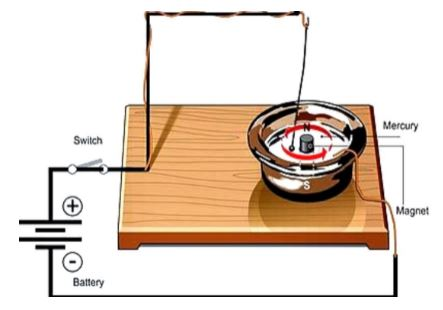
Oersted and Faraday unified which of the following achievements?
A. Electric and magnetic phenomena
B. Electromagnetism and optics
C. Electro-weak forces
D. Terrestrial and celestial
Answer
478.5k+ views
Hint: Electromagnetism refers to magnetism caused by electricity. Electromagnetism is now utilised in a wide range of electronic gadgets. However, until the discovery of electromagnetism, scientists believed that electricity and magnetism were unrelated.
Complete answer:
Faraday was researching electro-magnetism, which describes the interaction of electricity and magnetism. Hans Christian Oersted demonstrated that a cable carrying an electric current could cause a magnetic compass needle to move. Faraday demonstrated that the interaction of electricity and magnetism could cause continuous motion.
On the right is a mercury bowl with a magnet positioned vertically in the centre. One end of the magnet, in this case the north pole, protrudes. A piece of wire, long enough to reach into the mercury and suspended from a basic frame, is mounted vertically above the bowl. The wire can swing in any direction.The hanging wire is linked to a copper wire that runs from one terminal of a battery, which will supply the current. An additional copper wire links the other battery contact to the mercury in the bowl.
When the battery is connected, the dangling wire continuously revolves around the magnet. It will continue to operate until the battery dies or is disconnected. If the north pole of the magnet is at the top, it rotates counter-clockwise. It rotates clockwise if the south pole is at the top.Here's a diagram of how his experiment was set up.

So, the correct option is (A).
Note: Faraday's first independent contribution to electro-magnetism, a field of chemistry in which he would make many key discoveries, was this experiment. It was the first time that continuous motion was produced from chemical energy; it demonstrated that such motion could be produced through the interaction of electricity and magnetism. The principle underlying the electric motor is based on this phenomena.
Complete answer:
Faraday was researching electro-magnetism, which describes the interaction of electricity and magnetism. Hans Christian Oersted demonstrated that a cable carrying an electric current could cause a magnetic compass needle to move. Faraday demonstrated that the interaction of electricity and magnetism could cause continuous motion.
On the right is a mercury bowl with a magnet positioned vertically in the centre. One end of the magnet, in this case the north pole, protrudes. A piece of wire, long enough to reach into the mercury and suspended from a basic frame, is mounted vertically above the bowl. The wire can swing in any direction.The hanging wire is linked to a copper wire that runs from one terminal of a battery, which will supply the current. An additional copper wire links the other battery contact to the mercury in the bowl.
When the battery is connected, the dangling wire continuously revolves around the magnet. It will continue to operate until the battery dies or is disconnected. If the north pole of the magnet is at the top, it rotates counter-clockwise. It rotates clockwise if the south pole is at the top.Here's a diagram of how his experiment was set up.

So, the correct option is (A).
Note: Faraday's first independent contribution to electro-magnetism, a field of chemistry in which he would make many key discoveries, was this experiment. It was the first time that continuous motion was produced from chemical energy; it demonstrated that such motion could be produced through the interaction of electricity and magnetism. The principle underlying the electric motor is based on this phenomena.
Recently Updated Pages
Master Class 11 Computer Science: Engaging Questions & Answers for Success

Master Class 11 Business Studies: Engaging Questions & Answers for Success

Master Class 11 Economics: Engaging Questions & Answers for Success

Master Class 11 English: Engaging Questions & Answers for Success

Master Class 11 Maths: Engaging Questions & Answers for Success

Master Class 11 Biology: Engaging Questions & Answers for Success

Trending doubts
One Metric ton is equal to kg A 10000 B 1000 C 100 class 11 physics CBSE

There are 720 permutations of the digits 1 2 3 4 5 class 11 maths CBSE

Discuss the various forms of bacteria class 11 biology CBSE

Draw a diagram of a plant cell and label at least eight class 11 biology CBSE

State the laws of reflection of light

Explain zero factorial class 11 maths CBSE




